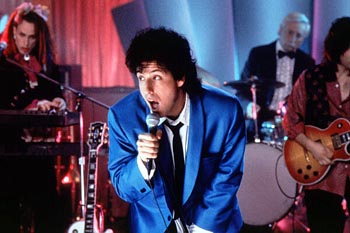Sweet and Sour
Love Stinks: Former 'Saturday Night Live' comic Adam Sandler is out of love.
A relationships expert analyzes love, loss, and 'The Wedding Singer'
By David Templeton
DR. JOHN AMODEO has been warned. He knows that The Wedding Singer--starring B-movie comedian Adam Sandler as Robbie, an optimistic crooner-for-hire specializing in wedding receptions, who endures a horrifying depression after he's dumped by his fiancée at his own wedding--is no work of art: it's crude, rude, and entirely predictable. In spite of this, I've let him know, the genuinely funny new love story is, um, kind of sweet. Surprisingly sweet. Virtually everyone who's seen the darn thing, in fact, has immediately popped out those same two words: surprising and sweet. Surprising because Sandler's films have never been accused of being remotely likable, and sweet because ... it just is.
"It was very sweet," Amodeo confirms, exiting the theater with a wistful smile. "It was very positive, very upbeat ... very sweet."
That's not all, either.
"I think The Wedding Singer is an accurate comment on the pervasive superficiality of many modern relationships," Amodeo enthuses. "It points to the real possibilities that exist for a more mature relating of two people's hearts, one that creates a foundation for a more lasting and satisfying romance."
Not bad for a movie in which the main character, in the midst of his post-break up doldrums, writes an earnest little love song with the abrupt chorus, "But it was all bullshit! It was all a goddamn joke! And when I think about you, I hope you fuckin' choke!" (By the way, that's not the sweet part; the likable aspects of the story are explored through Sandler's tentative love affair with Julie, a kind-hearted, unhappily engaged waitress played by Drew Barrymore.)
Amodeo is familiar with the ups and downs of love, as demonstrated by his successful North Bay therapy practice and his writings. His popular 1994 book, Love and Betrayal: Broken Trust in Intimate Relationships (Ballantine), is now in its fourth printing, and he's just finishing up work on another, an enlightening comparison of youthful notions of love and those of more emotionally mature lovers.
"The movie made a good contrast between what I call 'young love' and 'mature love,'" he points out. "Young love is the kind of thing where you think, 'I'm looking for someone to take care of me for the rest of my life, since I don't feel I could take care of myself.' Looking for someone to fill the inner emptiness. It's 'You make me whole,' rather than my becoming a whole person who can connect with another whole person.
"In young love," he adds, "you're mainly looking for someone to be your caretaker."
"If that's the case," I observe, "then 'young love' isn't necessarily relegated only to young people, is it?"
"Oh, not at all," Amodeo agrees. "Love is not a function of age. It's a function of maturity. People have young fantasies of love long into their 60s and 70s. Some have mature fantasies while still in their 20s.
"What happened with Julia and Robbie is," he continues [and if you don't want to know whether or not the film has a deliriously happy ending, read no further], "that over time they came to experience each other's joys and sorrows, I think. They got to connect on more than just a superficial physical level, but on a feeling/emotional level, which created the foundation for a more mature love.
"Robby and Julia got to share real human sorrows. They had the depth and maturity to recognize from their own experience what the other's sorrows were. There was real empathy between them. Without that kind of empathy and compassion there can be no mature or lasting love."
THE FUNNIEST MOMENTS of the film are those when Robbie is the most disheartened: his spirited disruption of a wedding reception with a snarling rendition of the song "Love Stinks"; his audaciously depressed love song that ends with a demand for someone to put a bullet in his head; the scene at a wedding when all the lovelorn guests rally behind him when he dares to say, "Like me, none of you will ever know true love."
"It was pretty real," Amodeo laughs. "Robbie was expressing what people often want to express, but hold themselves back from expressing. It was great that he could get into the depths of his pain."
"But, um, isn't that kind of unhealthy?" I wonder.
"Not at all. It's good to go with those feelings," he replies. "It's good to feel your anger and pain, it's good to go into the depths of that stuff. Because out of those depths, if you work with it, you can emerge a more open person."
"Is it a function of young love, then," I ask, "that when you're dumped, you sometimes swear off love altogether?"
"Sure," he nods. "A lot of people do that. When the illusion is exposed, people become very cynical and bitter. They close down their heart to connecting with anyone, taking on the safe belief that love is not possible for them. It's very tragic. But it's not necessarily the end of love for them, any more than it was the end of love for Robbie when he was left standing at the altar.
"What you have to do is to mine your pain," Amodeo states with calm authority. "You can mine that pain for the golden lessons that are buried there. Then you will be open to even deeper intimacies, even sweeter connections, than you ever were before."
[ Sonoma County | MetroActive Central | Archives ]
Copyright © Metro Publishing Inc. Maintained by Boulevards New Media.
![]()

K. Wright
In his ongoing quest for the ultimate post-film conversation, David Templeton takes author, psychologist, and relationships expert John Amodeo to see the disarming romantic comedy The Wedding Singer.
From the February 26-March 4, 1998 issue of the Sonoma County Independent.
![[MetroActive Movies]](/gifs/movies468.gif)